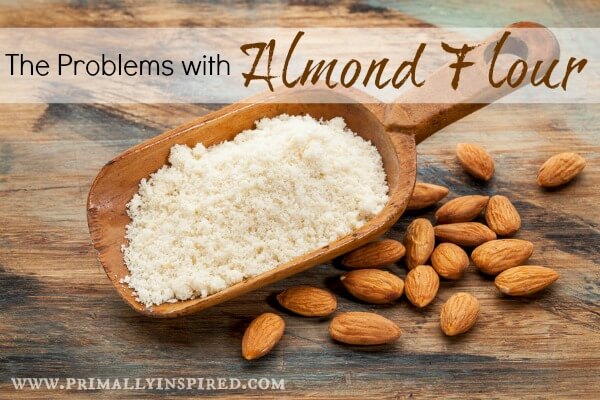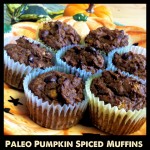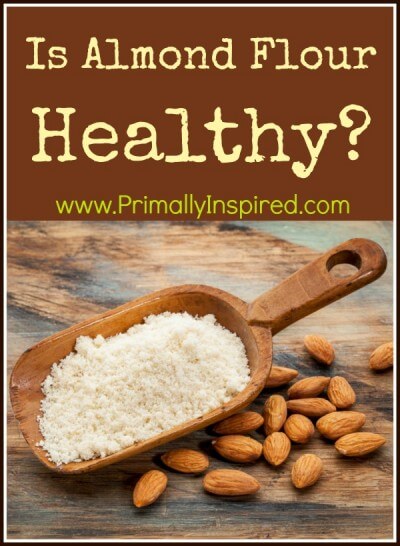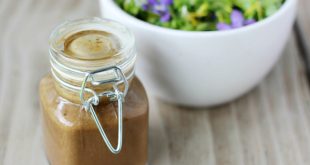 The Problems with Almond Flour
The Problems with Almond Flour
If you are a regular reader of Primally Inspired, you’ve most likely noticed that I tend to avoid cooking, baking and creating recipes containing almond flour.
In past posts and status updates on Facebook, I’ve touched lightly on the problems that I have with almond flour and why I choose coconut flour for my grain-free baking. Lately, I’ve been receiving questions asking “is almond flour healthy?” Or “why don’t you use almond flour?”
So I decided to dedicate a whole post about some of the problems with almond flour. This information is not always known in the Paleo and grain-free communities, especially if you are new to Paleo or eating a grain-free and gluten-free diet. It still surprises me to still see Paleo recipe after recipe and Paleo cookbooks containing large amounts of almond flour baked goods. I hope this post will help you take a closer look at almond flour and help you make an informed decision whether or not to include almond flour and almond flour baked goods in your diet.
Problem #1: Omega-6 Polyunsaturated Fatty Acids (PUFA)
Almonds contain a large amount of omega-6 PUFA’s. Omega-3 and omega-6 fats are PUFA’s and they’re both essential to your health, but in very small amounts. As part of a healthy diet, one of the best things you can do is reduce your PUFA and omega-6 intake.
And if you don’t think you consume excess PUFA because you are already eating well and don’t consume industrial oils, there’s a good chance you may be wrong. In this article, Chris Kressler explains why and suggests,
“the best approach is to limit n-6 intake as much as possible, ideally to less than 2% of calories”
On an average 2,200 calorie diet, 2% PUFA means only about 4 to 5 grams of omega-6 per day. This is very low and consuming anything with almond flour will quickly raise the amount to unhealthy levels. Just ¼ cup of almonds or one small serving of an almond flour baked good puts you at the 2% threshold and that’s assuming you aren’t consuming any other forms of omega-6. And when omega-6 is consumed in excess, it becomes problematic.
A diet with excess omega-6:
- produces an inflammatory response in the body
- slows down metabolism (hello weight gain!)
- impairs thyroid function
- depletes antioxidants
In other words excess PUFA’s = inflammation, weight gain, hormonal problems, and free radicals.
In fact, Dr. Weil says PUFA’s
“may explain the rise of such diseases as asthma, coronary heart disease, many forms of cancer, autoimmunity and neurodegenerative diseases, all of which are believed to stem from inflammation in the body.”
If you are eating Paleo or concerned about eating healthy, you likely go to great lengths to avoid vegetable and seed oils because of the high PUFA content. Yet many of us on Paleo or grain-free diets consume almonds and baked goods with almond flour to excess and don’t think twice about it.
Solution:
Be mindful of how many nuts and almond flour baked goods you are consuming. A small handful of nuts a few times a week is a healthy solution.
Problem #2: Oxidation
Polyunsaturated fats are extremely vulnerable to damage from heat, light, processing, pressure and oxygen. When exposed to these elements for too long, the fatty acids in the oil become oxidized, a scientific term that simply means that the oil becomes rancid.
Not only does this rancidity diminish the nutritional value, but the oxidation of fatty acids produces free radicals.
Under most circumstances, the problem of rancidity only arises when the fats are removed from their natural food package (not eaten in whole form). For example, the hard outer shell of the almond protects the fats from heat, light, and oxygen. Almonds also contain antioxidant compounds, such as vitamin E, that provide additional protection against oxidation. But when the protective coating is stripped and then ground to become almond flour, the delicate, unstable fats begin to become vulnerable to the elements.
If your almond flour isn’t already oxidized by the time you get the bag (from processing or light hitting it on the storage shelf), putting it into a hot oven or hot skillet is a way to cause the fatty acids to begin to oxidize.
Do you know why oxidation is so detrimental to our health? Oxidation creates free radicals. Jeffrey Blumberg, PhD, professor of nutrition at Tufts University in Boston sums it up nicely,
“The problem is, free radicals often injure the cell, damaging the DNA, which creates the seed for disease.”
Solution:
Foods rich in polyunsaturated fatty acids like almonds and almond flour should be stored in dark place with tightly closed containers in the refrigerator or freezer to prevent oxidation.
If they are not frozen, they should be used within a week of opening to prevent oxidation.
In addition, it’s recommended that these fats should never be heated on the stove or baked, especially with high temperatures or for long periods of time.
Even simpler solution:
Trade in your almond flour for coconut flour. Coconut flour is my grain-free baking flour of choice. Not only does it have a long list of health benefits, but consuming it actually boosts your metabolism. You can find my favorite coconut flour HERE. I also have plenty of grain-free baked good recipes on my blog that use coconut flour. If you have been turned off by coconut flour recipes in the past, please click on these baked good recipes listed below. I’ve been told that these will turn anyone into a coconut flour lover.
Problem #3: Difficult to Digest because of Anti-Nutrients like Phytic Acid and Lechtin
If you are following a Paleo or grain free diet, you probably know all about the dangers of anti-nutrients. In fact, anti-nutrients like phytic acid and lectins are some of the top reasons we stay away from wheat and grains. The reason phytic acid is so detrimental to our health is that humans can’t digest it. Not only does phytic acid cause digestive upsets by inhibiting enzymes that we need to digest our food, but it also binds to minerals and prevents us from absorbing nutrients.
But the real kicker is that almonds and other nuts contain more anti nutrients like phytic acid than grains! An almond flour muffin contains almost seven hundred milligrams of phytic acid (source).
Ramiel Nagel, author of Cure Tooth Decay, states,
In the context of a diet rich in calcium, vitamin D, vitamin A, vitamin C, good fats and lacto-fermented foods, most people will do fine on an estimated 400-800 mg (of phytic acid) per day. For those suffering from tooth decay, bone loss or mineral deficiencies, total estimated phytate content of 150-400 mg would be advised. For children under age six, pregnant women or those with serious illnesses, it is best to consume a diet as low in phytic acid as possible.
Many people mistakenly think blanched almond flour doesn’t contain anti-nutrients because the skin has been removed. While the almond skin does contain the majority of the anti-nutrients, blanched almonds still contain anti-nutrients that make them difficult to digest and block mineral absorption. If you try to sprout blanched almonds, you’ll see that they will still sprout. That means the enzyme inhibitors that cause digestive upsets and harm were still present prior to sprouting.
Solution:
Soaking and dehydrating almonds and nuts is recommended to reduce these anti-nutrients and make them easier to digest. But keep in mind that many sources seem to think that only somewhere between 10-30% of the phytic acid is removed during the soaking process.
If nuts are causing you digestive upsets or if you struggle with leaky gut or autoimmune conditions, bone loss, tooth decay or serious illness nuts and nut flours are not recommended.
Learn how to properly soak your nuts HERE and HERE.
You can also purchase already soaked nuts HERE.
Problem #4 High in Calories
Let me begin by saying that I’m not a fan or advocate of counting calories (read what I do instead HERE). But one mistake I often see from those following a Paleo or grain-free diet is to consume foods on the Paleo list with unabashed excess just because it’s Paleo.
Almonds and almond flour baked goods are some of the biggest offenders. I often see people eating large handfuls of almonds everyday or consuming almond flour baked goods on a regular basis thinking it’s ok and healthy because it’s “Paleo.” If you aren’t losing weight or your health problems aren’t getting any better, take an honest look at your nut and almond flour consumption and see if that may be the case for you.
Almonds are high in calories and can be easy to overeat, especially if you are consuming almonds in the form of almond flour. A small handful of almonds every other day or even every day definitely fits in a healthy lifestyle, but did you know there’s approximately 90 almonds and 720 calories in a cup of almond flour?! That’s a lot of almonds! Not only do most baked good recipes call for at least 2 cups of almond flour, but almond flour baked goods are very easy to eat in excess. That means that 1 almond flour cookie you just consumed has about 30 almonds in it.
Solution:
If you have been trying to lose weight unsuccessfully and/or still experiencing signs of inflammation, but are still consuming almond flour baked goods, almond flour could be the culprit. Try eliminating almond flour baked goods for a month to see if you notice any improvements.
But wait a minute! Aren’t almonds a real food and therefore healthy?
Yes! Almonds in their whole form contain many beneficial nutrients and antioxidants and are very healthy! They are a good source of manganese, copper, magnesium, vitamin E and riboflavin. They provide a great nutritional profile of carbohydrates, protein and fat making them an excellent snacking choice.
Almonds can become problematic when you eat them in excess, heat them or don’t prepare them properly, which are all easily done by consuming almond flour baked goods.
What do you think about almond flour? Do you include it as part of a healthy diet or do you prefer to use other grain-free flours?

Further web reading:
http://chriskresser.com/how-much-omega-3-is-enough-that-depends-on-omega-6
http://chriskresser.com/another-reason-you-shouldnt-go-nuts-on-nuts
http://www.marksdailyapple.com/nuts-omega-6-fats/
http://www.drweil.com/drw/u/QAA400149/balancing-omega-3-and-omega-6.html
http://www.cornucopia.org/almonds/
http://www.westonaprice.org/food-features/living-with-phytic-acid
 Primally Inspired Real food, Natural Remedies, Holistic Living
Primally Inspired Real food, Natural Remedies, Holistic Living















I think you have raised some interesting points here. On the other hand, the article completely ignores some of the positive features of almonds when used in moderation. For example, they are a good source of manganese, copper, magnesium, vitamin E and riboflavin.
There are many good reasons to not rely heavily on one flour. I like to rotate through my flours for different reasons: protein, fiber, flavor, texture, moisture, and structure. I use coconut, almond, tapioca, arrowroot, flax seed, pumpkin seed, chestnut, and grape flours. (Although I understand not all of those might be primal, all are paleo accepted).
While almonds are moderately high in PUFAs, you can effectively stay within the range of acceptance by most scientists by using no more than a 1/4 cup of almond flour per day if PUFA consumption is of concern to you (approximately 23 almonds), which would give you approximately 3.1 grams of PUFAs. As long as you don’t OD on peanut butter or other nut sources that day, you would be in decent shape to not exceed the 8 gram per day recommended limit of PUFAs. (Of course, that would assume that you are matching your consumption of PUFAs with Omega 3s at a 1:1 ratio as suggested by most Paleo and Primal experts).
At the same time, while your note about the high calorie count of almonds is valid, unless you are eating the almond flour in whole batches, you’re not going to be consuming a cup or more of flour in one sitting. My favorite cookie recipe, for example, serves 24, uses 2.5 cups of flour and I only eat 2 cookies in one sitting. So I’m only consuming .21 cups of that flour.
Also, on the same note, coconut flour is very high in fiber. While this is a good thing when consumed in moderation, the high fiber content can cause digestive issues like bloating, gas, and constipation.
So it really goes back to – use everything in moderation. Rotate around the flours depending on your dietary needs per day, and you shouldn’t run into any of these issues.
Definitely, Connie!
Thanks so much or your feedback! I did touch on the benefits of almonds at the end of the post and say they are healthy 🙂 At the end, I also say the problem is not almonds or even almond flour. I definitely agree with everything you are saying – everything in moderation is so key!
Thanks for the article I found that almond flour made me sick
Who the hell eats only two cookies in one serving? When I make cookies, you better grab them quick, because I’m going to eat the whole tray.
I have been trying to use Almond in my baked goods but it tastes awful! I even went so far as to throw it away and buy new but it still taxes terrible. My brain won’t let me swallow it!
I agree Holly. I tried my best to bake some bread with it for my husband (to watch sugars) but dang — it tastes like crap no matter what recipe I tray. I am going to throw it out. Better to make normal bread with regular sugar and just limit the intake. Everything in moderation works.
I love your recipes and posts. I do prefer coconut flour but so many recipes call for coconut. Do you have a conversation chart? Thanks
I am new to Paleo diet and I have read tons of things suggesting Almond flour. I’m so confused! Just when I think I have figured out some good things to eat, I read something else telling me not to! 🙁
I think the best thing you can do is listen to your body! If you notice digestive upsets or signs of inflammation, you can try cutting it out for a few weeks and see if it helps. If you don’t have signs of upsets, I am a big fan of everything in moderation 🙂
Help, i hate everything I’ve tried so far with coconut flour. I don’t like taste or texture and I’ve tried a lot of recipes.what else can i use instead of coconut flour?
Thanks for the interesting article. Do you feel this way for all nuts?
Tina
Thanks Kelly, great article! My issue is: Almond is the only nut I can eat. And I can handle only a little bit if coconut (allergic reaction).
I agree, moderation is key. Since I’ve gone gluten and grain free, I don’t bake much anymore either. Thanks for all your research!
Thanks for your comment, Suzanne! I see many people consuming nuts in excess and many people tell me that when they reduced or eliminated their nut intake, they experienced better health and less inflammation (myself included!). There is no “perfect” food and my intentions when writing this were to make more people aware of some of the problems with almond flour and be mindful of how much they are consuming – not to totally scare them away from it. Everything in moderation, for sure!!!
Good grief… I just switched to paleo this year, bought a huge supply of both coconut, and almond flour, convinced my mother to make the switch… we both feel so much better. Now this? I think they’re right when critics say, “we always find something wrong with something… just give it five years, and they’ll discover it causes cancer, or some other disease…”. 🙁 Feeling very frustrated right now.
I have been doing paleo for over three years now. I am constantly learning, changing, improving. It is a process. In the beginning, I was frustrated too…thinking I researched and I knew best…only to read something else different. We need to educate ourselves the best we can and make decisions that are best for us. I use the best resources (that is why I am on primally inspired) and make the best decisions and changes. Hang in there. Continue to read and learn.
would almond milk be bad too then? my 3 & 4yr olds drink 1 cup a day. Now you have me worried :-/
I too would like to know if almond milk is ok? My daughter who is also four is dairy free and drinks almond milk instead. Thanks for any help
I much prefer coconut flour. Unfortunately, I know have an egg allergy and coconut flour loves eggs. I have had to go back to almond flour. Have you every successfully made a coconut flour recipes without eggs?? If so, I’d go back to coconut flour in an instant!
I love coconut flour and have made some phenomenal cookies with it, but recently I’ve had issues with my gallbladder and coconut flour sent me into a full attack. I keep the almond flour to a minimum and rarely eat baked goods – I tend to use almond flour for coatings. Have you heard of problems with coconut flour and gallbladder or SIBO symptoms?
What is the substitute for almond flour? Can we substitute cocunut flour for almond flour?
You cannot substitute coconut flour for almond flour. Coconut flour is very dry; almond flour is very moist. They are two totally different flours. You will need to use recipes that are made for the specific flours.
Following
your concerns with omega 6 in almonds is impressive, but consider the fact that ALL almonds in the US are pasteurized by heat or chemicals for the past 6 years which kills ALL the vital nutrients of almonds, in essence you’re only consuming fiber
labeling still allows companies to list as “raw” “organic” after pasteurization
hard nuts should be soaked then dehydrated before consuming which changes the proteins to amino acids for easier digestive assimilation
“what you eat today, don’t eat again for four days”
this helps people with food intolerance
everything in balance, trial and error brings each individual to the place that helps them balance their own system
Thank you, Sandra! When I learned about the pasteurization of almonds in the US (I believe I have the article linked in my post under the oxidation/processing keypoint), I was totally shocked! It’s crazy to me that we can still label them as raw and no one knows.
I read an article about the heat and chemical pasteurization too. The article said that you can still get truly raw almonds if you buy direct from the growers stands. By law the growers can not send them out of state unless they have been pasteurized…bummer!
Hi, what about almond milk. I’m trying to find healthier substitutions for cow’s milk.
Have you tried coconut milk?
I really feel that everything is moderation is key. It never fails, that people will always find something bad in something healthful. Unless you’re consuming an entire 16 oz bag of almonds or an entire batch of cookies on a daily basis, I think you’re ok. Let’s be realistic here.
Hi do you mean ALMOND MEAL or ALMOND FLOUR , are you considering ACTIVATED ALMONDS?
What is your take on almond milk vs coconut milk? Just wondering. Thanks, I love your post.
Hi, thanks for the post! I too am wondering if you would consider almond milk a bad choice as well? I switch between almond milk and coconut milk right now, but I only recently started Paleo because nothing else was working for me and I still get stomach discomfort at times and don’t feel wonderful yet, like so many people say they do while on Paleo! I’d appreciate your opinion on the almond milk. Thanks so much for your posts and your recipes!
Great post! Yeah, I think its easy to consume too many nuts on a paleo diet (I have to watch myself!) and almond flour makes it TOO easy. You forget that what you are cooking with is essentially a big pile of ground up nuts. Nuts should be a very small part of our diets.
I’m still learning the Paleo, healthy lifestyle. A great discouragement is the nearly exclusive use of coconut oils and flour, as well as sunflower oil. Allergic to both, I remain confused and frustrated.
I also would like to know about almond milk, both my kids have dairy allergy/sensitivity issues ad drink almond milk. What would you suggest and why?
Is eating lots of peanut butter a cause of indigestion and heartburn? I am just getting started with Paleo and need some help in discovering what is harmful and causative of digestive issues.
I found that almonds, and almond flour, caused major bloating for me. Other people won’t react this way at all. It is definitely a “know your own body” thing. I still have about three pounds of almond flour but I am gradually making the switch to all coconut flour. Here’s hoping I can handle it.
What about almond butter? I love it so much but I suppose it’s probably good in moderation as well. Also, do you only use coconut flour for baking? And what do you think about buckwheat? Thanks!
This is such a great article! I recently experienced a dramatic drop in my hormones. My platelets, red and white blood cell count, thyroid hormones, estrogen, as well as severe food allergies and intestinal/digestive upset. I’ve been told that it could be a pituitary problem although I’m very into the power of nutrition and the health of the gut, like you are. I’m shocked to hear this info in your article! I’m OBSESSED with almond butter…. not raw. I don’t eat more than 1-2 Tbsp a day but I also drink almond milk because I’m soy and dairy free. I also have really dry skin so I thought omega’s, especially from fish like salmon, are good for you. Is almond milk okay?? If not, what kind of dairy/soy free milk is okay? And are the omegas from fish different than the ones you referred to above? Also, are omega 3’s just as bad? Thank you for being so helpful and informative!
Hi Kelly-
Thank you for the info. I do however love your brown butter chocolate chip cookies!!
Do you have a conversion/alternative for the almond flour? Have you made them with another flour?
I am wondering if anyone got the answers about almond milk.
I have switched to it, and have adjusted to the taste.
I am not Paleo, eating low-carb and mostly vegan.
I really hate that almond milk may not be a good alternative….
Ahhh, words of wisdom. I have come to the same conclusions about almond flour. It was initially the PUFA that made me question the reliance on this flour but you bring up other pertinent points.
I have tried making macadamia nut flour but that ain’t gonna happen! What I do now is add macadamia nuts to my Vitamix with the liquid ingredients and blend until smooth. I also rely on juicing pulps to add bulk to baked goods. Depending on what you are juicing, this pulp is usually predominantly cellulose which is a non-fermentable fiber so it shouldn’t be a problem for those of us with bloating issues for those reasons.
I think, in the end, we need to relearn healthy eating habits that don’t rely on baked goods.
Have you ever heard of or tried Cappellos gluten free grain free pasta? Its made of only almond flour, tapioca flour and egg. I eat it typically once a week but now I’m thinking maybe I shouldn’t at all. Thoughts?
Hi Lindsay! Yes, I’ve heard of Cappellos – yum!! I really didn’t mean to instill any fear about eating almonds! I think what you are doing is great – Almonds have so much good nutrition! The problem lies when we start replacing a large portion of our foods with almond/almond flour products. So many people I know started a grain-free type of diet and then replaced almost everything with almond flour and then were wondering why they still felt crappy and couldn’t lose weight. This post was really intended to address that issue, not scare people from eating almonds or the occasional almond flour treat. I honestly regret posting this because I never intended to instill fear about foods, which is what I think it ended up doing – total fail on my part 🙁 Enjoy your weekly Cappellos!! 🙂
Please don’t EVER feel bad or hesitate to post things you know to be true in food! I have been paleo for almost a year now and I still have inflammatory responses to food. I’m going to cut out a portion of my almond flour (cause I use it a BUNCH!) If this works, you will be my hero!
Thanks for posting
Thanks for your encouragement, April!
I have interstitial cystitis, IC, which is an autoimmune disease of the bladder. The past couple of weeks I have been on a low carb diet and was using almond flour to coat my fish and now my bladder is on fire! I couldn’t understand what would be causing this increase in pain and inflammation since I wasn’t eating too much of a variety of foods, meat , green beans, broccoli, etc. and almonds are on the list of OK foods for people with IC. I am glad I found this article and it makes since now that the almond flour has been my problem this whole time with it causing inflammation and free radicals!
Glad it could help, Sheila! Sending you healing blessings!
Excellent article! Another big concern with almonds is the EXTREMELY high content of oxalates which is highly concentrated in the flour, butter, and milk. Oxalates are toxic and can cause many health problems. I learned this the hard way by consuming ‘almond everything’. The Trying Low Oxalates website is very helpful to understand the toxicity of oxalates and how to lower your intake for improved health. You must lower the intake of these foods very slowly for when your body begins to dump excess oxalates, it can cause heightened health problems. If you’ve been on a high oxalate diet for a long time, many health issues arise.
this is a really strange post. all the talk about omega 6 and omega 3 is taken out of the context of the bound and stable form it is in in almonds (cough cough the vitamin e too..), almonds (and other drupes) are not directly at risk the way ‘nuts’ and ‘seeds’ like walnuts or pecans are.
the smell of almonds like with macademias and walnuts/pecans correlates extremely strong with what state they are in (blanched almonds smell consistent until cooked optimally where they change smell dramatically, then once again when ‘burnt’ and oxidized and again when charred, additionally spoiled (oxidized) almonds have their own distinct smell with notes of similarity to rancidified algae oils (the ‘smell’ of oxidized pufas/omega 3s/fishy smell) but have a pretty unique take on it, it is imeddeatly recognized in the mouth and usually repulsive to the nose if smelled first, the body has a natural violent gag/disgust reaction to it (if you have learned to repress this response by forcing yourself to ‘eat your broccoli’ and other wildly unhealthy poisonous foods due to your guardians ‘behavioiral conditioning’ on you, you may no longer have this natural revulsion, in which case you should fix yourself before going full paleo or any kind of natural diet, as they are all reliant on you ‘listening’ to your instinctual reactions). So it is VERY obvious unless you have diluted them signifcantly or there is too many overwhelming spices or such (cinnamon/ginger is very overpowering). The texture will also change.
I’d say from personal experience almonds especiall blanched almonds are MUCH more vulnerable to moisture/humidity spoilage or storage container reactions (metal/tin/copper is very potent at causing reactive changes in almonds, and plastics, the fat will cause the plastics to break down)).
once cooked however you have a limitef window to eat any almond goodies, no more than a day or too if refrigerated. and if youve put any ‘carbs’ with them like sugar, you open up to molds and such very quickly.
but in a blanched flour form they are incredibly stable and VERY obvious when they no longer are.
the salmonella risk is much higher for something like lettuce (which is much worse than raw slimey chicken for getting salmonella into you..).
it is not possible to legally obtain real ‘raw’ almonds, i am suspicious of your claim about having successfully sprouted them it reads more like you read it is possible but that you have nk first hand experience or education background in ANYTHING you posted about as all those citations from the research your ‘information’ are referncing are taken out of context as well.
almonds can only be grown to fruiting in a few highly specific locations in the world (a small part of california and the mediterranean and no where else aside from maybe a one off tree or highly controled labratory nursery), so there is no where you ‘could’ obtain raw almonds unless you live there and and steal them or grow them yourself as it is very illegal to sell them to you actually raw.
even ‘sprouted’ raw almonds you can buy online are not made with real raw almonds (again none of these companies can legally obtain them) and are just soaked pasturized almonds at best, so a lot of this post comes off as uninformed bullshit pulled from reading ‘reports of reports.’ Especially given the extreme misinformation surrounding the omega 6-3 and pufa information (though yes pufas are the most reactive and unstabled but whipe contained in their originating foods in their ‘alive’ or ‘sealed’ form, up till heating, they quite stable.).
I could just tell you the other fats in almonds KEEP the particular pufas present stable as well but you SHOULD have already knew that if you werent just referencing ‘reports of reports’ out of context and with low understanding of how fats work.
You wont be getting making bodyfat from eating almonds (not possible, you’d be eating a fatal dose of almonds every day, few people are so repressing of their own health to forcefeed themselves 2 or more lbs of almonds a day…)but rather from the OTHER things you eat besides almonds. Another contextual factprnyou take put of context to spread your biased agenda/hate of almonds apparently? geesh.
Thanks for your input, Hunter.
Hi, I found your article particularly interesting, because today for the first time ever I made a two minute muffin out of almond flour, which tasted delicious. However, as the muffin travelled down my gullet it caused me quite a lot discomfort, and I reached the conclusion that having just found an exciting alternative to all that protein I would have to abandon it. I shall see if coconut flour is a good replacement.